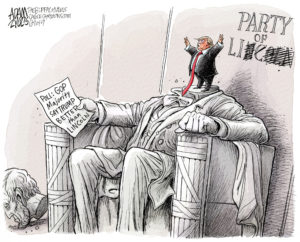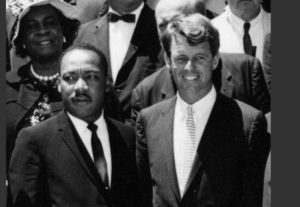Lincoln Would Weep
Republicans are unhappy with their field of presidential candidates and yearn for someone who will come along to save them. But here's what the GOP doesn't want to confront: Its problem lies not in its candidates, but in itself.
Republicans are unhappy with their field of presidential candidates and yearn for someone who will come along to save them. But here’s what the GOP doesn’t want to confront: Its problem lies not in its candidates, but in itself.
The candidates appear much smaller than they are because the party’s primary voters and core interest groups insist upon cutting them down to size. To win a Republican nomination, a candidate has to move right, recant absolutely any past position that violates the current conservative catechism, and never dare to speak the truth that solving our deficit problem will require new revenues — aka, taxes.
Thus we have Mitt Romney defending the individual mandate to buy insurance that was part of the health plan he championed in Massachusetts, but then denouncing President Obama for imposing a similar mandate at the national level. This shuffle wasn’t good enough for the guardians of conservative orthodoxy. It ruled that Romney will merit salvation only by fully repudiating his greatest achievement as governor.
Former Minnesota Gov. Tim Pawlenty has been absolutely abject in declaring his sinfulness for once believing in a cap-and-trade solution to the global warming problem. “I’ve said I was wrong,” he insisted. “It was a mistake, and I’m sorry.” Pass him the sackcloth-and-ashes, please.
And then there is Mitch Daniels. The Indiana governor has the advantage of not having joined the race yet, which is why so many in the GOP are turning their lonely hearts to him.
Daniels was lauded for bravery when he called for a “truce” in the culture wars. But in the first test of his commitment to a truce, he chose to break it by signing a law cutting off all state funding for Planned Parenthood. What else would Daniels have to do to win the nomination? He is more conservative than the conventional wisdom now paints him. But what will be left of even the current Daniels once the Congregation for the Doctrine of the Faith, otherwise known as the GOP primary electorate, is done with him?
Even if you accept some pandering to the primary electorate, the Republicans’ problem is deeper and it creates huge difficulties for the country as a whole. The reason Washington is paralyzed over the deficit is because most Republicans are petrified to admit that we will never get our budget close to balance without some tax increases. Both Ronald Reagan and George H.W. Bush raised taxes when deficits got too high. Now, Reagan’s party would condemn him as a big-taxing liberal.
In a rational deficit debate, Republicans would call for more spending cuts than Democrats want and also some form of a consumption tax to avoid hikes in levies in income and capital gains. Democrats would insist on fewer cuts and tax increases on income, capital gains and dividends. We’d fight it out, and maybe even find ground for compromise. But as only a few brave Republicans publicly acknowledge, taking all revenues off the table is not a serious position.
This goes to the biggest problem of all. Today’s Republicans have totally broken with the party’s long commitment to innovative national action: the land-grant colleges, national parks, food and drug regulation, interstate highways and government student loans. The creation of the income tax itself was supported by a good conservative Republican president, William Howard Taft.
Today’s GOP is committed to one proposition above all others: reducing the size of the federal government. In this, Republicans resemble no group so much as conservative Democrats from the 1850s — minus, it must be said quickly and with gratitude, the shameful position such Democrats took on slavery. Even nullification and secession talk is now in vogue among some Republicans.
Imagine what would happen today to a Republican who said this: “Having never been States, either in substance or in name, outside of the Union, whence this magical omnipotence of ‘State rights’ . … Much is said about the ‘sovereignty’ of the States; but the word, even, is not in the national Constitution. … ” Abraham Lincoln spoke those words on July 4, 1861, and believed so much in the national government that he waged a bloody war to save it. Can you imagine any Republican quoting Lincoln on states’ rights during the 2012 debates?
What this nation most needs right now is a Republican Party that believes again in its own best traditions. It would be lovely if at least one of the party’s presidential candidates stood up for them.
E.J. Dionne’s e-mail address is ejdionne(at)washpost.com.
© 2011, Washington Post Writers Group
Your support matters…Independent journalism is under threat and overshadowed by heavily funded mainstream media.
You can help level the playing field. Become a member.
Your tax-deductible contribution keeps us digging beneath the headlines to give you thought-provoking, investigative reporting and analysis that unearths what's really happening- without compromise.
Give today to support our courageous, independent journalists.






You need to be a supporter to comment.
There are currently no responses to this article.
Be the first to respond.